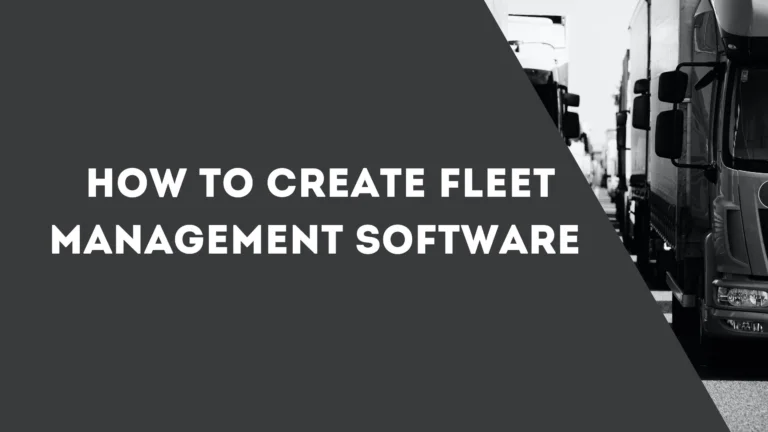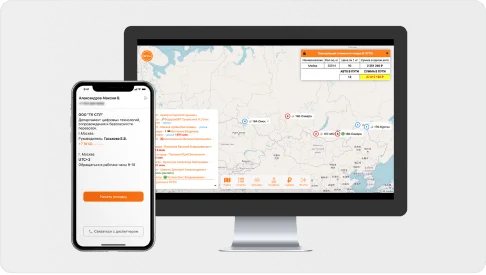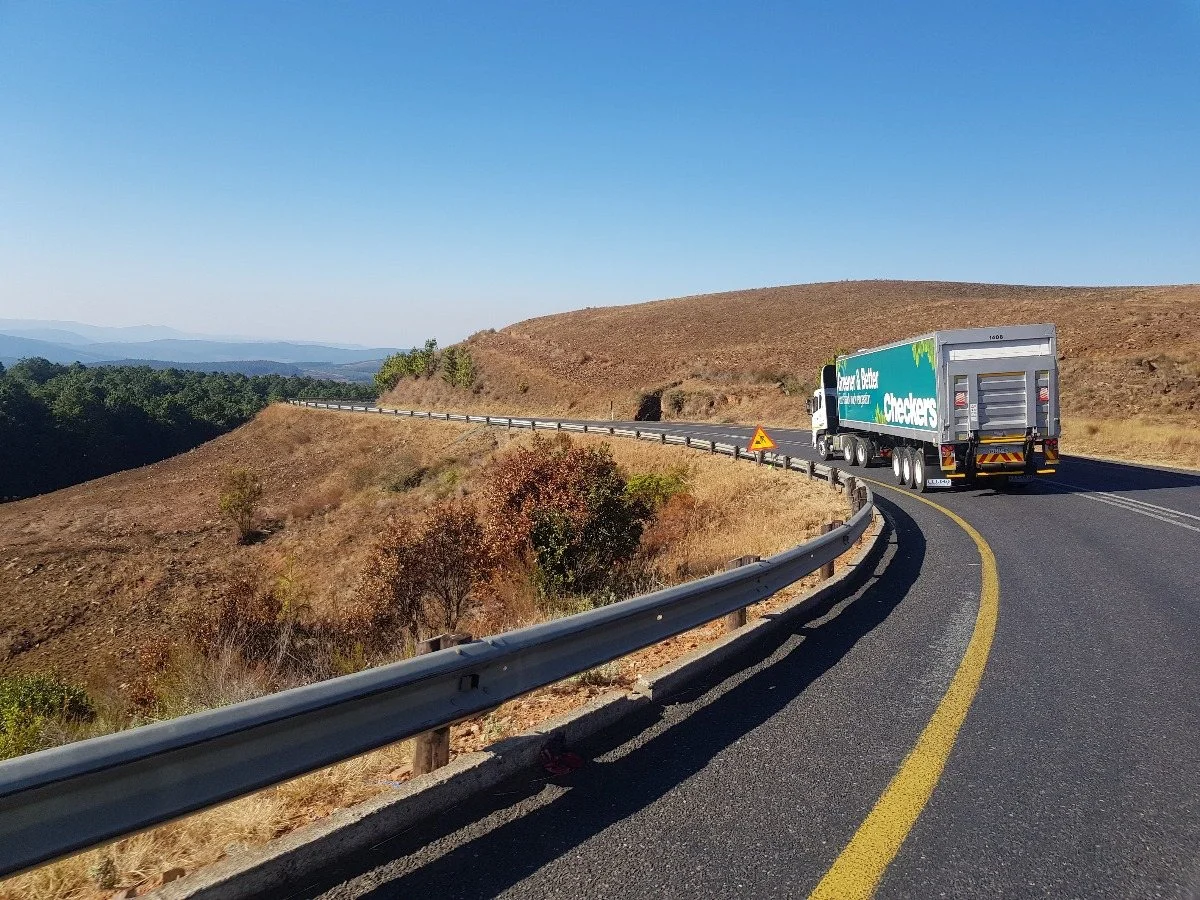Fleet Management Software Development Guide
Explore the dynamic world of vehicle operations management software, where cutting-edge technology meets efficiency. This article delves into the latest innovations and trends shaping the future of fleet tracking and management. From the evolution of GPS tracking to the rise of autonomous and electric fleets, discover how these advancements are revolutionizing the way businesses handle vehicle maintenance, local deliveries, and overall fleet efficiency.

How to create fleet management software
Introduction to fleet management application development
In the dynamic landscape of modern business operations, vehicle management has become a cornerstone for efficiency and productivity. The increasing reliance on fleet management software reflects a significant shift in how businesses handle their operations.
This software, encompassing tools for GPS tracking, route optimization, and fleet maintenance, has revolutionized the way fleet managers oversee and optimize their fleet performance. The integration of advanced technologies like real-time location tracking and fuel management systems has not only enhanced driver safety but also contributed to substantial cost savings and improved customer satisfaction.
Introducing Scrile – fleet management software development company
Enter Scrile, a seasoned player in the realm of management software development with over 20 years of experience. Scrile stands out in the development of customizable fleet management solutions, offering a comprehensive suite of services tailored to the unique needs of businesses.
Whether it’s for small businesses or large-scale operations, Scrile’s expertise in crafting fleet management systems that are both efficient and cost-effective is unparalleled. Their approach to software development is not just about creating a tool; it’s about engineering a holistic fleet management solution that resonates with the core needs of modern fleet operations.
Understanding Fleet Management Software

Definition and Purpose
Vehicle operations management software is a specialized software designed to assist fleet managers in overseeing, organizing, and recording all aspects of fleet operations. This software encompasses a range of fleet management tools and functionalities, including GPS tracking, route optimization, vehicle maintenance, and fuel management.
The primary purpose of this software is to enhance the efficiency, safety, and cost-effectiveness of managing a fleet of vehicles. It serves as an essential fleet management system for businesses, enabling them to track and manage their fleet vehicles effectively, ensure driver safety, and optimize fuel consumption and operational costs.
Evolution and Current Trends in fleet management app development
Early Stages and Evolution
Initially, vehicle management was about basic vehicle tracking and maintenance schedules.
Over time, the focus shifted towards comprehensive solutions encompassing driver behavior, fuel efficiency, and fleet performance.
Current Trends in Vehicle Management Technology
Integration with Mobile Devices and Apps: Modern vehicle management software often includes mobile apps, allowing for real-time monitoring and management on the go.
Advanced GPS and Telematics: Today’s systems offer sophisticated GPS vehicle tracking and fleet telematics for precise location tracking and data collection.
Data-Driven Decisions: Emphasis on analytics and custom reports for informed decision-making.
Focus on Driver Safety and Compliance: Incorporating features like driver safety scores, in-cab voice coaching, and driver vehicle inspection reports.
Software as a Service (SaaS): Many providers now offer fleet management solutions as a service, ensuring scalability and accessibility for small businesses and owner operators.
Eco-Friendly Practices: With growing environmental concerns, features like fuel management and monitoring fuel efficiency are gaining prominence.
Enhanced Customer Satisfaction: Through improved route planning, maintenance tracking, and delivery services.
The evolution of vehicle management software reflects a shift from basic vehicle tracking to a holistic approach that encompasses every aspect of vehicle management. This evolution is driven by technological advancements and the growing needs of businesses to manage their fleets more efficiently and effectively.
Key Features of Effective Fleet Management Software

GPS Tracking and Vehicle Monitoring
Real-Time Location Tracking: Utilizing GPS tracking devices and fleet management tools, this feature allows fleet managers to monitor the exact location of their vehicles, essential for efficient route planning and fleet tracking.
Vehicle Performance Monitoring: Tracks key metrics like speed, engine status, and more, helping in maintaining efficiency and vehicle performance.
Fuel Management and Optimization
Monitor Fuel Consumption: Advanced fleet management systems provide insights into fuel consumption, helping in identifying areas for cost-saving.
Fuel Cost Management: By analyzing fuel usage data, fleet managers can make informed decisions to reduce fuel costs and improve overall fuel efficiency.
Driver Behavior Monitoring and Safety
Driver Safety Features: Includes monitoring driver behavior, driver vehicle inspection reports, and implementing driver safety scores.
Enhanced Compliance: Ensures drivers adhere to safety regulations, reducing the risk of accidents and enhancing overall fleet safety.
Trip Logging and Mileage Calculation
Automated Trip Logging: Vehicle management software simplifies recording trip details, helping in accurate mileage calculation and vehicle management.
Efficient Route Optimization: With GPS vehicle tracking, the software offers route optimization, saving time and fuel for vehicles.
Automated Vehicle Maintenance and Alerts
Maintenance Reminders: Sends automated alerts for scheduled maintenance and routine maintenance, ensuring timely fleet maintenance.
Inventory Tracking: Integral for inventory management, allowing fleet managers to keep track of parts and supplies for vehicle maintenance.
These key features represent the core functionalities of the best fleet management software, designed to streamline vehicle operations and enhance the management of business vehicles. By leveraging these features, fleet managers and fleet owners, especially in small businesses, can ensure their entire fleet operates at peak efficiency with minimal operational disruptions.
Steps in Developing Vehicle Management Software

Identifying Business Goals and Requirements
Understanding Specific Needs: Begin by defining the unique requirements of your business, whether it’s for fleet tracking, fleet maintenance, or safety of the driver.
Setting Clear Objectives: Establish clear goals for what the vehicle management software should achieve, such as reducing fuel costs, improving fleet efficiency, or streamlining task management.
Choosing the Right Software Type
Custom vs. Off-the-Shelf: Decide between custom-developed management solutions tailored to specific needs or off-the-shelf fleet management tools that offer standard functionalities.
Assessing Cost and Value: Evaluate the fleet management software cost against the value it brings to your operations.
Key Considerations in Software Development
Feature Selection: Prioritize key features like gps tracking, maintenance reminders, and real-time location tracking.
User-Centric Design: Focus on the UI and experience, ensuring the software is intuitive and accessible on mobile devices and mobile apps.
User Interface and Experience
Intuitive Design: Ensure the fleet management platform has a user-friendly interface that simplifies complex tasks.
Accessibility: Design for various users, from managers to owner operators, ensuring ease of use for unlimited users.
Scalability and Integration Capabilities
Future-Proofing: Develop a fleet management system that can scale with your business, accommodating more vehicles and users over time.
Software Integrations: Ensure compatibility with existing systems and the ability to integrate new software seamlessly.
Security and Data Privacy
Protecting Sensitive Data: Implement robust security measures to safeguard data related to fleet tracking, vehicle documents, and driver vehicle inspection reports.
Compliance with Regulations: Ensure the fleet management software solution adheres to data privacy laws and industry standards.
Developing effective vehicle management software involves a careful balance of technical expertise, user-centric design, and strategic planning. By focusing on these steps, developers can create a comprehensive fleet management tool that not only meets the current needs of businesses but is also equipped to evolve with future demands and technological advancements.
The Role of Scrile in Development of Vehicle Management Services

Overview of Scrile’s Expertise and Services
Scrile, a comprehensive IT company with over 20 years of experience, specializes in full-cycle software development. Our services range from business analysis, user experience design, custom software development, to cloud services and product launch. Scrile’s unique approach combines a deep understanding of design and technology, ensuring our solutions are not only technically proficient but also user-friendly and intuitive.
Scrile’s Approach to Fleet Management Solutions
Scrile’s methodology in developing fleet management services emphasizes user-centric design and technological innovation. Our approach involves a collaborative process with clients, ensuring that the end product aligns with the specific business needs and goals. By leveraging our diverse expertise in areas like mobile apps, databases, and cloud services, Scrile provides scalable and efficient fleet management services that cater to the evolving needs of businesses.
Case Study: Driver Tracking App

Scrile’s development of a driver tracking app for STL Traffic showcases our capability in delivering specialized fleet management apps. The project involved creating an application and an administrator’s website for real-time tracking of couriers, specifically truck drivers, across Russia. The app allows drivers to send coordinates using GPS data, enabling administrators to monitor all couriers in real-time and maintain efficient communication.
Key Challenges and Solutions:
Real-Time Monitoring: The app was designed to monitor drivers on a map in real-time, displaying their current status and cargo details.
Courier Information Management: A comprehensive profile system was developed for each courier, allowing administrators to view and edit details.
Technical Implementation: The project encompassed application architecture, server-side notifications, and map integrations, including features like real-time map updates and driver ratings.
Technologies Used:
Languages: Objective-C, Java, TypeScript
Framework: React Native
Database: MongoDB
Development Environments: Node.js, Xcode, Visual Studio Code
The collaboration with Scrile enabled STL Traffic to transition from concept to a fully functional real-time courier tracking system. This case study demonstrates Scrile’s ability to deliver custom fleet management apps that are not only technologically advanced but also tailored to the specific operational needs of their clients.
Read more about this project: Driver tracking app: two months from idea to launch
Cost Considerations in Development of Fleet Management Software

Factors Influencing the Cost of Development
The development of vehicle management software involves various factors that significantly influence the overall cost. These include:
Complexity of Features: Advanced features like GPS tracking, vehicle tracking, and driver vehicle inspection reports add to the development cost. The inclusion of real-time location tracking, maintenance alerts, and inventory management systems also contribute to increased complexity and expense.
Customization Needs: Tailoring the software to specific business requirements, such as managing local deliveries or integrating fleet tracking for delivery businesses, can impact the cost. Customization for specific vehicle management software, like mobile apps or a fleet management platform, requires additional resources.
Technology Stack: The choice of technologies, whether for a simple fleet management app or a comprehensive fleet management platform, affects the cost. Technologies for GPS tracking, fleet complete systems, or mobile apps can vary in price.
Integration with Existing Systems: Integrating the new software with existing systems, especially in cases where inventory management or fleet maintenance systems are already in place, can be a complex and costly process.
Budgeting for Long-Term Maintenance and Updates
To ensure the best fleet management software performance over time, budgeting for long-term maintenance and updates is crucial. This includes:
Regular Software Updates: Keeping the software updated with the latest features and security patches is essential. This might include enhancements in fleet tracking, GPS tracking capabilities, or new functionalities for mobile apps.
Maintenance Costs: Ongoing maintenance is vital for the smooth operation of the software. This includes fixing bugs, updating to newer versions, and ensuring compatibility with new hardware or software platforms.
Scaling and Expansion: As the business grows, the software may need to scale or add new features. Planning for these expansions, such as adding capabilities for managing a larger fleet or integrating advanced tracking and maintenance alerts, should be factored into the budget.
Technical Support: Continuous technical support ensures that any issues with the software are promptly addressed, maintaining operational efficiency and minimizing downtime.
In summary, developing a fleet management solution requires careful consideration of various cost factors, from initial development to long-term maintenance. A well-planned budget that accommodates these aspects ensures the creation of a robust, efficient, and scalable management system.
Innovations in Fleet Management Software

The Evolution of GPS Tracking Technology
Advancements in GPS Technology: The landscape of fleet tracking has undergone a significant transformation, thanks to the evolution of GPS technology. From basic location pinpointing to advanced real-time location tracking, GPS technology has become more precise, reliable, and accessible. This leap in GPS capabilities has been a game-changer for fleet management platforms, offering unprecedented visibility into vehicle operations.
Impact on Operational Efficiency: The integration of real-time location tracking in vehicle management software has revolutionized how businesses manage their fleets. It enables fleet operators to monitor vehicle movements, optimize routes, and respond swiftly to on-road incidents. This level of tracking efficiency not only enhances operational control but also contributes to significant time and cost savings, making it a staple feature in the best fleet management software.
Leveraging Data for Fleet Optimization
Harnessing Data Analytics: In the realm of vehicle management, data is king. The best fleet management software now leverages advanced data analytics for a multitude of purposes. Predictive maintenance, a key feature of these platforms, utilizes data to foresee and prevent vehicle breakdowns, ensuring fleet longevity and reducing downtime. Route optimization algorithms analyze traffic patterns and road conditions to suggest the most efficient paths, saving fuel and time.
Role of Driver Vehicle Inspection Reports: An often underappreciated yet vital aspect of vehicle management is the driver vehicle inspection report. These reports play a crucial role in maintaining fleet health and ensuring regulatory compliance. By systematically recording vehicle condition and performance, these reports provide valuable data that feed into the fleet management solution, enabling proactive maintenance and ensuring fleet complete functionality.
To sum up, the innovations in vehicle management software, particularly in GPS tracking and data analytics, have not only enhanced the capabilities of these platforms but also transformed the way fleets are managed, offering more efficient, reliable, and cost-effective solutions.
Enhancing Operational Efficiency with Modern Fleet Management Apps

Key Advancements in Fleet Management Apps:
Real-Time Location Tracking: Modern fleet management apps now offer advanced location tracking features. This technology enables fleet operators to monitor their vehicles in real-time, ensuring efficient route management and timely deliveries.
Streamlined Management of Local Deliveries: These apps have significantly simplified the process of managing local deliveries. They provide tools for route optimization, delivery scheduling, and real-time updates, which are crucial for businesses relying on timely local distribution.
User-Friendly Interfaces: Today’s fleet management services come with user-friendly interfaces, making it easier for operators to navigate and utilize the full range of features without extensive technical knowledge.
Enhanced Communication Channels: Improved communication tools within these apps allow for seamless coordination between drivers and managers, leading to more efficient operations and quicker response times.
Data-Driven Decision Making: By offering detailed analytics and reports, these apps empower fleet operators to make informed decisions based on data trends related to vehicle usage, fuel consumption, and delivery efficiency.
Incorporating these advanced features, modern fleet management apps are transforming the way operations are conducted. They not only offer comprehensive solutions for tracking and managing vehicles but also enhance the overall efficiency of managing local deliveries and other fleet-related tasks.
The Trends and Predictions of Fleet Management

The Rise of Autonomous and Electric Fleets
Integration of Autonomous Driving Technology: The future of vehicle management is poised to be significantly impacted by the integration of autonomous driving technology. This innovation promises to revolutionize fleet management services by enhancing safety, efficiency, and reliability. Autonomous fleets could potentially reduce human error, optimize route planning, and even operate continuously without the constraints of driver fatigue, heralding a new era in vehicle operations.
Shift Towards Electric Vehicles: Another transformative trend is the shift towards electric vehicles (EVs) in fleets. This move is driven by the growing emphasis on sustainability and the reduction of carbon footprints. Thus the implications for fleet maintenance and management are profound. Electric fleets require different maintenance schedules and infrastructure, such as charging stations, compared to traditional vehicles. Fleet management apps will need to adapt to monitor battery life, charging status, and range, in addition to the usual vehicle metrics.
Enhancing Delivery Efficiency
Evolving Software for Local Deliveries: As e-commerce continues to boom, the need for efficient local delivery management has never been greater. Vehicle management software is evolving to meet this demand, focusing on optimizing delivery routes, minimizing delays, and ensuring timely service. Advanced algorithms and real-time data analytics play a crucial role in dynamically adjusting routes and schedules to avoid traffic congestion and other delays.
Growing Trend of Fleet Management Apps: The use of mobile management apps is on the rise. It reflects the need for on-the-go management and decision-making. These apps offer location tracking, real-time alerts, and the ability to manage deliveries remotely. Thus providing fleet operators with unprecedented flexibility and control. The convenience and efficiency offered by these apps are making them an indispensable tool in most fleet management platforms.
In conclusion, the future of vehicle management is marked by exciting technological advancements. While the evolution of software and apps will continue to enhance delivery efficiency, the integration of autonomous and electric vehicles will redefine fleet operations. These trends not only promise to improve the operational aspects of vehicle management but also contribute to a more sustainable and efficient future in logistics and transportation.
Conclusion

In the rapidly evolving landscape of vehicle management, selecting the right development partner is paramount. The ideal partner not only contributes to the creation of the best fleet management software but also ensures that it is tailored to specific business needs, from fleet maintenance to managing local deliveries.
Scrile stands out in this realm, offering expertise and innovative solutions that cater to the diverse demands of vehicle management. Our approach to software development, focusing on user-centric and efficient vehicle management software, positions us as a key player in shaping the future of this industry.
The Future of Fleet Management Software
The future of fleet management software is geared towards more integrated, intelligent systems. They should offer location tracking, comprehensive fleet maintenance, and enhanced capabilities to manage maintenance with just a few clicks. In this future, Scrile is poised to play a significant role, leveraging our experience and technological prowess to deliver solutions that not only track vehicles and manage operations but also contribute to the overall efficiency and growth of businesses.
In conclusion, the journey towards a more connected and efficient vehicle management service is ongoing, and with partners like Scrile, businesses are well-equipped to navigate this path successfully.
FAQ
What is fleet software development?
Fleet software development involves creating specialized software solutions designed to manage, track, and optimize fleet operations. This process includes developing applications that facilitate fleet maintenance, offer location tracking, and manage various aspects of vehicle management, such as scheduling, route planning, and compliance with regulations. The goal is to enhance the efficiency and productivity of operations.
What is fleet management software program?
A fleet management software program is a digital solution that assists in managing, tracking, and coordinating fleet cars and operations. It typically includes features for vehicle maintenance, driver management, fuel management, and compliance tracking. The best fleet management software programs offer comprehensive tools that help in optimizing the performance and efficiency of the fleet. Also, they ensure timely deliveries and maintenance.
How do you create a fleet management system?
Creating a management system involves several steps. Initially, it requires identifying the specific needs of the fleet, such as tracking, maintenance, and delivery management. Then, the development of a user-friendly fleet management app or platform is undertaken. Features like GPS tracking, maintenance scheduling, and reporting tools are integrated. The system should be scalable and adaptable to the changing needs of the fleet.
What is ERP fleet management?
ERP (Enterprise Resource Planning) vehicle management refers to the integration of management functions into an ERP system. This integration allows for a more holistic approach to managing operations. It combines fleet maintenance, asset management, and financial tracking in a single system. ERP management services often provide a comprehensive overview of the fleet’s performance. Thus helping businesses make informed decisions and improve overall efficiency. They are particularly beneficial for larger organizations that require a unified system to manage their diverse operations.
Exploring AI Solutions and Advanced Software Development for Enhanced Operations
- Creating a Driver Tracking App: Dive into the development of a driver tracking application. Learn about GPS technology, real-time data processing, and designing an app that provides valuable insights for driver management.
- Building an AI Assistant: Discover the steps to create an AI assistant. Explore the concepts of machine learning, natural language processing, and user experience design to develop an intelligent and interactive assistant.
- Constructing an AI Chatbot: Gain insights into the development of AI-powered chatbots. Understand the integration of AI algorithms, conversational interfaces, and bot training for effective communication and automation.
These articles provide valuable knowledge on harnessing AI technology and software development to create innovative solutions in fleet management, driver tracking, and customer interaction.
For more insights and in-depth discussions on similar topics, be sure to also explore other articles on our blog: